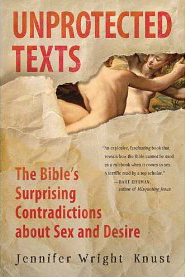Book Notes
 Jennifer Wright Knust, Unprotected Texts; The Bible's Surprising Contradictions About Sex and Desire (New York: HarperOne, 2011), 343pp.
Jennifer Wright Knust, Unprotected Texts; The Bible's Surprising Contradictions About Sex and Desire (New York: HarperOne, 2011), 343pp.
Jennifer Knust says she doesn't want to "take sides" in debates about sexual-political questions, but that's not really accurate. She admits that she writes out of frustration toward conservative Christians who argue that the Bible presents a clear and simple sexual ethic. As an ordained American Baptist pastor and professor of religion at Boston University, her concerns are both pastoral and scholarly.
That's a good and important task; it's also a very easy task. You don't have to be a scholar to read the Bible and realize how complex its content is on the subject of sex. Sometimes polygamy for men (but not women) is taken for granted; David had seven wives. On the other hand, Paul and Jesus privilege celibacy as the preferred state. Why is marrying a "foreigner" wrong? What is sex with angels (Genesis 6:4 and Jude 6-7)? Why all the regulations about circumcision, semen, and menstruation?
So far so good — there's not a single or systematic sexual ethic in the Bible. These texts were written at different times, by different authors, for different communities and reasons. But therein lies the more difficult problem which Knust doesn't even begin to address. On the one hand, most all denominations affirm something like her own American Baptist one, that Scripture is the "authoritative guide" for serving God (13). On the other hand, Knust cautions against this when it comes to sex: "It is a mistake to pretend the Bible can define our ethics for us in any kind of straightforward way." (245). The devil is in the details of her last six words.
For Knust, and against those frustrating conservatives, most all sex and sexual desire seems to be good, never bad. Many of her own conclusions depend on privileging certain texts, translations, and interpretations over others, even though she's careful to admit that "some historians" might disagree with her. She's right that we need to read Scripture with more nuance, care, and creativity, and with some greater principle in mind to guide us (eg, the Golden Rule), but she never suggests what that might look like.
So, her book serves half a loaf. I wait for her next book to move beyond negative caution to positive guidance. And I hope that she'll incorporate sociological studies like the new one by Donna Freitas, The End of Sex; How Hookup Culture is Leaving a Generation Unhappy, Sexually Unfulfilled, and Confused About Intimacy (2013). Yes, some sex is good, but some sex is very bad indeed. How does the Bible help us tell the difference? How do we move from its ancient historical descriptions to contemporary ethical prescriptions?


